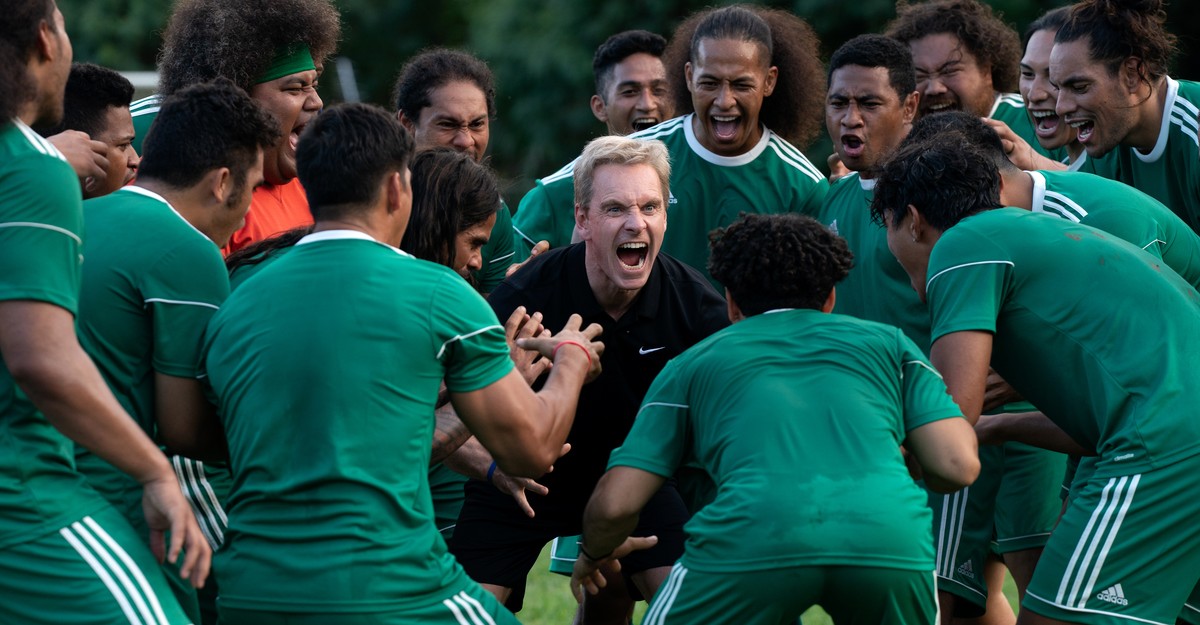Taika Waititi made a name for himself by finding the funny in dark topics. His breakout movies include What We Do in the Shadows, a shaggy hangout comedy about bloodsucking vampires, and Hunt for the Wilderpeople, about a wayward foster kid on the run from child protective services. Waititi’s breezy sense of humor, combined with his willingness to tackle thorny subjects, made him an interesting talent in the world of comic filmmaking. His first Hollywood project was Thor: Ragnarok, a film that blew an extended raspberry at the Marvel Cinematic Universe but still managed to work within its complicated lore, earning plaudits as the Marvel movie for people who don’t like Marvel movies.
A film like Next Goal Wins, Waititi’s latest comedy effort, is about lovable underdogs triumphing against the odds—theoretically a far lighter lift than vampires, foster homes, and figuring out what’s up with Loki. An inspirational sports comedy based on a documentary, Next Goal Wins is about the American Samoa men’s soccer team, a squad famed for their incompetence. In 2011, the team gave itself the difficult task of scoring a single goal in one of their games and hired an American coach to help them get over the hump. It’s a movie in the mold of hits such as Cool Runnings and The Mighty Ducks, following a bunch of endearing misfits as they shamble toward vague athletic triumph. Waititi has a way with such characters and has had plenty of fun in the past subverting Hollywood formulas. So why is this film such a dire, uncomfortable watch?
Waititi’s problems began with Jojo Rabbit, his World War II satire that saw the director playing a sitcom version of Adolf Hitler as an imaginary friend to an addled boy in the Hitler Youth. That film tried to mock Hitler and the Nazi Party as a group of preening incompetents while still underlining their monstrousness. Though I found the tonal swings too severe to take seriously, it was an award-winning hit—but since then, Waititi’s comic timing has felt definitively off. His return to Marvel with Thor: Love and Thunder upped the ratio of cheap gags and tipped over into sneering apathy toward its characters; it was disjointed enough that I started rooting for the villains to kill everyone off.
Next Goal Wins was actually filmed before Love and Thunder, with reshoots added on years later post-lockdown. But it’s undeniably the worst film Waititi has ever produced, a hash of lazy jokes and “random” humor centered on one of the most uncomfortable lead performances I’ve ever seen in a comedy. The film’s protagonist is the real-life Dutch American manager Thomas Rongen, a seasoned international coach who was lured to American Samoa after weathering personal and professional anguish. He’s played by Michael Fassbender, an actor of serious renown who’s largely been off our screens for the past few years but who just turned in a fabulously ice-blooded performance in David Fincher’s The Killer.
Perhaps unsurprisingly, a man suited to playing deadly assassins feels a little out of place in a winsome comedy. Fassbender usually does his best work playing nervy, tightly wound characters in films such as Shame and Steve Jobs, and his performance as Rongen has that same energy, of a man nursing dark secrets and struggling to get over the collapse of his marriage and career. The cheerful island territory of American Samoa welcomes him with open arms, setting just about the lowest career expectations possible—he isn’t even predicted to win a game. However, Rongen spends most of the film under a foul cloud, screaming at his disorganized team and rebuffing the friendly advice of his new boss, Tavita (the lovely Oscar Kightley).
Rongen’s arc is simple enough: a path to redemption for this grump who just needs to relearn his love of the game. But Fassbender starts things off far too prickly and cruel, failing to sell the ensuing transformation; the actor’s comfort levels with the knowing, self-referential tone of Waititi’s humor are clearly very low. An early conflict in the film sees Rongen reacting with caution and confusion at the presence of Jaiyah Saelua (Kaimana), a player on the team who is fa’afafine, a recognized third gender in Samoan society. At one point, annoyed at her tardiness, he deadnames her as an act of petty revenge. Yes, Rongen eventually learns his lesson and apologizes, but there’s a little too much venom in his initial conduct, and it becomes progressively unclear why this mean coach is the main character in a story about Samoan soccer.
Maybe it’s because Waititi simply can’t take anything that seriously anymore. Every dramatic moment lands with a thud, and every joke is a deflationary aside, a shrug reminding the audience not to worry too much about what’s happening on-screen because it’ll all work out in the end. He seems to have lost his grasp of sincerity; when Next Goal Wins aims for more trenchant emotional material, it rings false.
All Waititi seems to have left is flippancy, which is worth a few chuckles but was never what made him good as a storyteller. His earlier films were patient with their characterization and devoted to investing the viewer in the action, even while they had fun satirizing Hollywood tropes. Next Goal Wins is suffused with the dullest writing possible but still dares to mock its own wilted screenplay, in an pose of insincere self-awareness. The result is a calamitous own goal.
Next Goal Wins is a dire, uncomfortable watch that misuses Taika Waititi’s breezy humor. Read More

